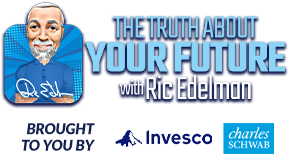Robots at Your Service
Guess who’s taking your order?
Ric Edelman: It's Thursday, November 30th. We've talked about the fact that so many industries are struggling to hire enough workers. We've also talked about the fact that automation is replacing many jobs.
Well, here's a new example. In South Korea, some restaurant waiters are not human. They're robots built by a company in China. The robots bring food to the tables and they collect the dishes after the meal. There are 5,000 of these robots operating in Korean restaurants that's expected to double next year. The bots only cost $7,500, a lot less than what you'd have to pay for a human. And humans don't seem to care. People don't want to work as waiters, and diners don't seem to care that they're being served by a robot instead of a human. The humans get to seek better jobs, and you never get annoyed that your waiter is ignoring you.
South Korea leads the world in robot density. 10% of all manufacturing employees are robots, compared with 4% in Japan, 3% in China, and 2.5% in the US. And in South Korea. It's not just factories where you find robots. They're allowed to use public sidewalks and roads to make deliveries, and soon they'll be permitted to cook food in schools. The robot market in South Korea is growing 23% a year, but it's still small; $500 million in sales this year is projected to hit a billion by 2026.
And even though South Korea is buying the bots, it's not manufacturing many of them. Chinese robots are cheaper than the bots made in either South Korea or Japan. And the South Korean government is supporting all of this in a big way. It's paying up to 70% of the cost of the bots, a very strong enticement for businesses to use them.
When are you going to see a robot serving you in a restaurant? I think it might be a while, but sooner than you think.
Does this make you interested in investing in robotics? One problem is that with a lot of robotics companies, they're privately held. You can't buy shares of their stock. This problem exists for a lot of companies and a lot of industries. You know, back in the day, meaning 20, 30 years ago, companies would go public because they needed to raise capital. But today, companies go public to cash out. Companies are also discovering that it's really a nuisance to be a publicly traded company. They have to deal with Sarbanes-Oxley and a whole bunch of other securities regulations. Life is so much simpler when you're a private company. This is why a lot of public companies are going private. Bottom line: in the Wilshire 5000 index, it only holds 3,000 stocks because that's all there that are publicly traded here in the US today.
Indeed, we used to have 15 years ago about 7,500 companies publicly traded. Today it's less than half that number. The big shift has been to private equity. And those investments are readily available private equity (PE) funds. The problem is they're really only available to institutional investors and very wealthy people, because you typically have to invest $1 million or more, and the funds typically have a 7 to 10 year life with no liquidity. In the meantime, these things are so risky that you're not even allowed to invest in a private equity fund unless you have at least $1 million in net worth, excluding your home, or $200,000 in annual income.
And the private equity firms themselves make a ton of money because they charge far higher fees than ordinary mutual funds or ETFs. ETFs typically charge, oh as little as 0.05%, maybe all the way up to 1%. But private equity firms, they charge two and 20, meaning they charge 2% a year plus 20% of the profits. There's no way a mutual fund would ever get away with that. So maybe you don't have enough money to invest in a private equity fund, or maybe you don't even want to because of the fees or lack of liquidity.
But here's an idea some private equity firms are themselves publicly traded, which is rather ironic if you think about it. Bottom line: even if you can't afford to invest in a PE fund, you can afford to buy shares of the PE firm. There's even an ETF that buys shares of them. You might want to consider it the Invesco Global Listed Private Equity ETF, the symbol PSP. You can learn more about it at Invesco.com or ask your financial advisor about it.
You know, the holiday season can cause a lot of stress and strain. Here's how you can get through it all. Listen to my wife Jean's podcast, Self-Care with Jean Edelman. Each week, Jean shares her experiences and knowledge, and her weekly tips can be really helpful this time of year. Jean's focus is on self-care, mindfulness and overall wellness, and her new episode comes out today. You can listen to Jean everywhere you get your podcasts. You can also subscribe at Self-Care with Jean.com.
-----



